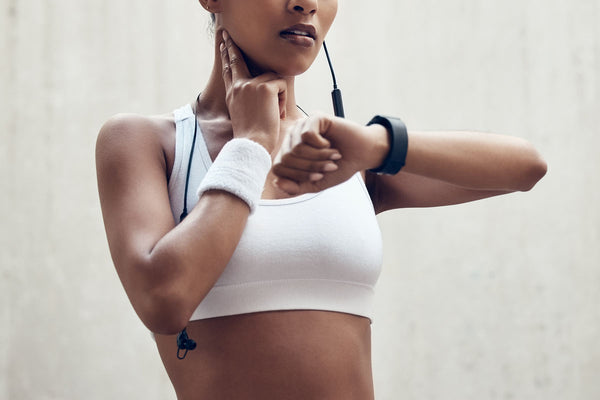We’ve all experienced an elevated heart rate after a tough cardio or resistance-training workout. This is one sign that you’re stressing your body and putting in quality effort in the gym. As you start your cool down, you notice that your heart rate is still elevated.
How long should your heart rate stay elevated after exercise? And, how quickly should your heart rate return to normal after you’ve completed your workout?
As you might expect, it’s highly individual and is affected by a variety of factors.
Let’s talk about it.
Why Your Heart Rate Stays Elevated After Working Out
For starters, having an elevated heart rate following strenuous physical activity is totally normal. The more you exert yourself the greater demand there is for oxygen and nutrients. To meet these increased demands, your heart and lungs have to increase their output.
Following a workout, your heart rate remains elevated as your body begins its cool down and recovery process. Over the next several minutes, your heart rate will gradually slow down and return to its normal resting beats per minute. In other words, it doesn’t automatically go from 150 beats per minute (BPM) back to 60 BPM.
Remember, even though your workout has ended and your high level of exertion has stopped, your body still has an increased demand for oxygen and nutrients to restore energy balance, repair tissues, and rebalance hormones. This is also known as the EPOC effect (excess post-exercise oxygen consumption), and to fulfill that oxygen need, your heart has to work more.
Again, over the next several minutes of your cool-down, your heart rate will slow down and return to its normal resting BPM.
How Long Does Your Heart Rate Stay Elevated After Working Out?
Heart rate recovery refers to the speed at which your heart rate (pulse) returns to normal after finishing a workout. It is determined by the difference between your max heart rate during exercise and your heart rate one minute after finishing your workout.
Generally speaking, fitter individuals will see a decrease in heart rate of at least 18 beats per minute after a minute of rest, and the shorter your heart rate recovery is, the healthier you are, typically.
Research shows that individuals with slower heart rate recovery are at a higher risk of cardiovascular disease and diabetes as well as earlier mortality.[1,2]
Factors that impact your heart rate recovery include (but aren’t limited to):
- Genetics
- Age
- Sex
- Current level of fitness
- Intensity of exercise
- Duration of exercise
- Hydration status
- Caffeine intake
- Smoker/non-smoker
- Sleep
- Pre-existing medical conditions (hypertension, heart disease, diabetes, etc.)
How to Calculate Heart Rate Recovery
To calculate your own heart rate recovery, all you need is a heart rate monitor or wearable fitness tracker, such as a FitBit, Garmin or smartwatch. Make a note of your highest heart rate during your workout (usually immediately after your most intense exercise/set).
Then, take note of your heart rate one minute after you finish your workout.
Subtract these two numbers. You now have your heart rate recovery.
For example, let’s say your max heart rate during your HIIT workout was 180 beats per minute. One minute after your last exercise, your fitness tracker shows your heart rate at 160 beats per minute.
Subtract 160 from 180 beats per minute. Your heart rate recovery is 20 beats per minute (BPM).
How to Improve Heart Rate Recovery
Heart rate drops the fastest within the first minute after finishing exercise, and then continues to drop more gradually over the next 2-5 minutes.
Depending on your level of fitness, workout intensity/duration, and the other factors we mentioned above, it may take up to 10-20 minutes for your heart rate to return to its normal resting rate.
Here are some other helpful tips to improve heart rate recovery and cool down after a workout:
#1 Perform a Thorough Cool-Down
Having a dedicated cool down period following your workout can go a long way to helping your heart rate and breathing slow down. Group fitness classes and follow-along workout videos tend to have abbreviated cool-downs due to time constraints (30-minutes, 45-minutes, 60-minutes, etc.) and trying to fit in as much “working out” as possible”, but a proper cool down is critical for your body after an intense training session.
Effective cool downs help lower breathing and heart rates, reduce cortisol levels, and stretch tensed muscles. These collective actions enhance your body’s recovery ability beyond what it naturally does when you stop exercising and will allow you to continue to train more frequently.
#2 Hydrate
Lack of hydration is a key factor in elevated heart rates and increased feelings of fatigue during exercise. To make matters worse, many of us are dehydrated and don’t realize it. In case you weren’t aware, even minor dehydration (as little as 2%) can increase the risk of injury and reduce strength, power, and endurance.[3,4,5]
While it’s easy to think that slamming a big glass of water before a workout is enough to fulfill hydration needs, the reality is that hydration is a day-long process. It begins in the morning when you wake up and continues until you go to bed at night.
As such, have a glass of water when you wake up in the morning and drink fluids throughout the day. Working, training, and living in hot environments increases the body’s water and electrolyte requirements, so if you live in hot areas, keep this in mind.
Adding a scoop of 1UP Hydration Plus, which includes essential electrolytes and other cell-hydration amino acids, to your water bottle can help to fulfill your fluid requirements during the day.
When you’re properly hydrated, you’ll find that you’re naturally energized, have less fatigue and soreness, and think clearer, too!
#3 Fuel Your Body Properly
Nutrition significantly impacts how well you perform during exercise as well as how quickly you recover. Going into a workout properly fueled lets you push harder, burn more calories, and get better results. Refueling your body after a hard workout accelerates glycogen replenishment, halts muscle breakdown, and supports the repair process.
Exact pre-workout and post-workout meals will vary based on your individual needs (and is a topic for a separate article), but having a great pre workout supplement is something we can all get on board with.
1UP Pre Men and 1UP Pre Women are specifically formulated to deliver the right nutrients your muscles need to resist fatigue, push harder, and build more strength.
After your cool down, have a scoop of whey protein (or our new clear whey for those that want a light, refreshing shake) to kickstart the recovery process.
#4 Maintain High Levels of Physical Activity
The more physically active you are, the better your heart rate recovery will be. If you’re currently living a sedentary lifestyle, it’s best to start slowly and gradually ramp up the duration and intensity of your workouts.
For general health, current recommendations are to get at least 150-300 minutes of moderate intensity exercise or 75-150 minutes of vigorous intensity cardio.[6]
#5 Get Enough Quality Sleep
Quality sleep is essential to performance, recovery, and overall health. Not getting enough sleep is a significant stress to the body, one that’s known to contribute to accelerated aging, increased feelings of fatigue, decreased performance & recovery, and poor mood.
Sleep deprivation, even as little as a single night of disrupted sleep, increases heart rate and blood pressure and negatively affects heart rate recovery.[7,8]
To help improve your chances of getting a good night’s rest, follow these tips:
- Maintain a consistent bedtime (ideally, even on weekends)
- Limit/avoid caffeine after 3PM
- Limit/avoid blue light exposure at least 2 hours before bed
- Listen to relaxing music
- Meditate/pray/journal before bed
- Read
- Taking a warm bath or shower
- Wear loose comfortable clothing
- Keep your bedroom dark and cool
Last, but not least, you can also try adding supplements to your nighttime regimen, such as Beauty Dream PM. These products contain calming ingredients, that help ease a hyperactive nervous system, enabling you to unwind and settle in for the deep, restorative sleep you need to recover faster.
References
- Cole CR, Blackstone EH, Pashkow FJ, Snader CE, Lauer MS. Heart-rate recovery immediately after exercise as a predictor of mortality. N Engl J Med. 1999 Oct 28;341(18):1351-7. doi: 10.1056/NEJM199910283411804. PMID: 10536127.
- Sung J, Choi YH, Park JB. Metabolic syndrome is associated with delayed heart rate recovery after exercise. J Korean Med Sci. 2006 Aug;21(4):621-6. doi: 10.3346/jkms.2006.21.4.621. PMID: 16891803; PMCID: PMC2729881.
- Berning J, Steen SN. Sports Nutrition for the Nineties: The Health Professional’s Handbook. Gaithersburg, MD: Aspen Publishers Inc; 1991. pp. 153–174.
- Savoie FA, Kenefick RW, Ely BR, Cheuvront SN, Goulet ED. Effect of hypohydration on muscle endurance, strength, anaerobic power and capacity and vertical jumping ability: A meta-analysis. Sports Med. 2015;45:1207–1227.
- Judelson DA, Maresh CM, Anderson JM, Armstrong LE, Casa DJ, Kraemer WJ, Volek JS. Hydration and muscular performance: Does fluid balance affect strength, power and high-intensity endurance? Sports Med. 2007;37:907–921.
- Physical Activity Guidelines for Americans
- Mezick EJ, Matthews KA, Hall MH, Richard Jennings J, Kamarck TW. Sleep duration and cardiovascular responses to stress in undergraduate men. Psychophysiology. 2014 Jan;51(1):88:98. doi: 10.1111/psyp.12144. Epub 2013 Sep 9. PMID: 24016263; PMCID: PMC3883723.
- Cincin A, Sari I, Oguz M, Sert S, Bozbay M, Atas H, Ozben B, Tigen K, Basaran Y. Effect of acute sleep deprivation on heart rate recovery in healthy young adults. SLeep Breath. 2015 May;19(2):631-6. doi: 10.1007/s11325-014-1066-x. Epub 2014 Oct 16. PMID: 25319876.





